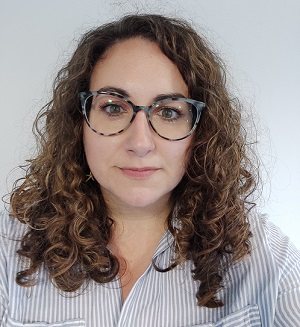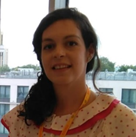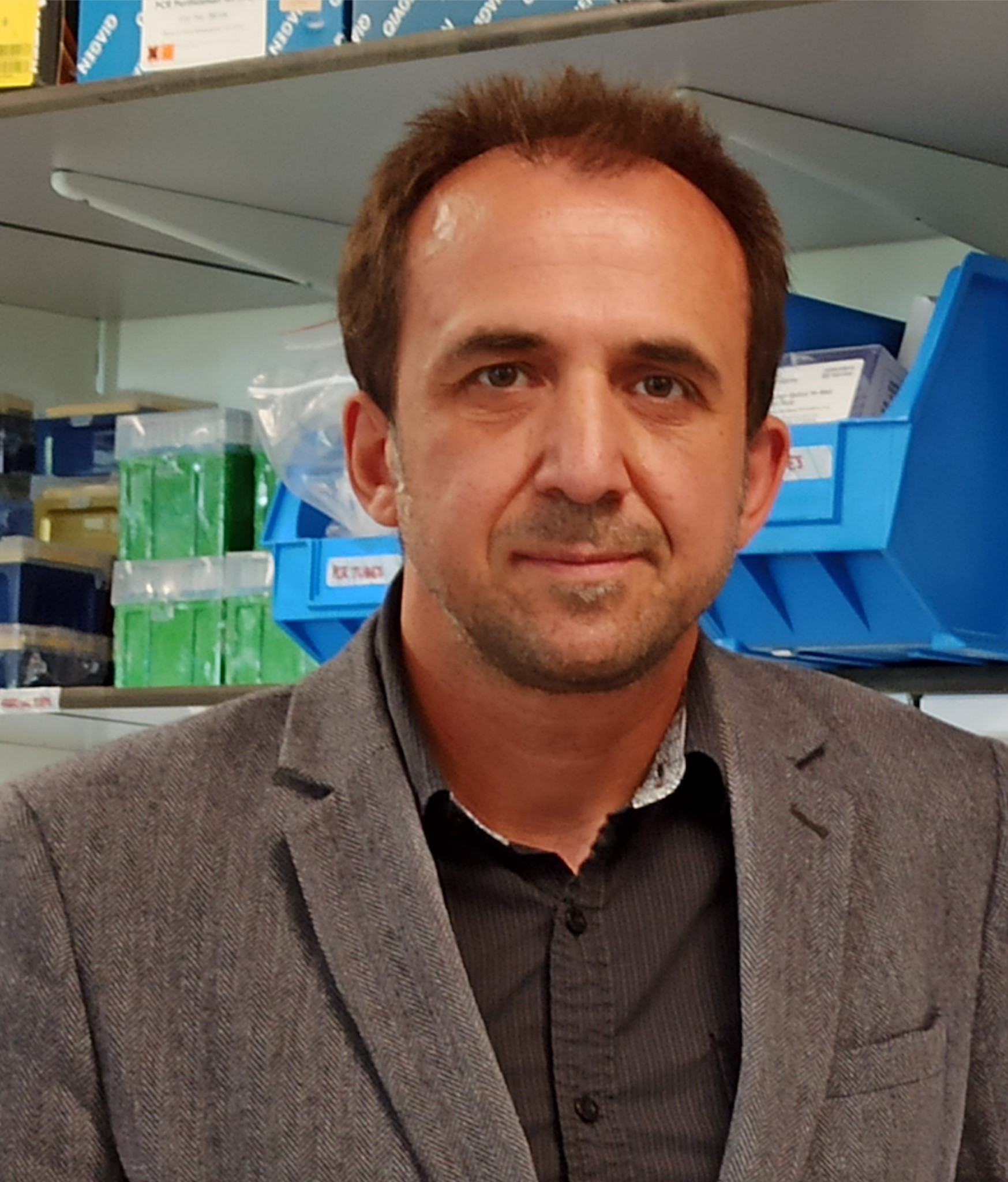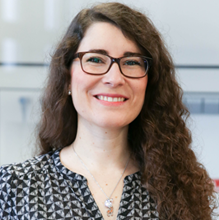- Almudena Martí, Université de Lorraine (France)
 Dr Almudena Marti (AM), holds since September 2021, an assistant professor position (Maître de Conférences) in L2CM UMR 7053, at the University of Lorraine (France).In November 2015, AM defended her PhD thesis entitled “Functionalized gold nanoparticles for the detection of biologically active molecules”.Her expertise lies between organic and analytical chemistry specially focused on the synthesis, characterization, and study of different probes for biosensing applications and diagnostic technologies. After completing her PhD in the IDM laboratory at University of Valencia (Spain). After three postdoctoral contracts, at the University of Montpellier (2016), the University of Twente (2016 – 2018) and the University of Southampton (2019 – 2021) where she worked on the development of new biosensors for cancer and disease biomarkers detection and their implementation of point of care devices. In addition, she gained expertise on the use of different materials and their surface modification. Therefore, her research project at L2CM aims to develop new functional mesoporous materials from organized molecular systems for applications in energy (emissive materials for the conversion of solar energy) or health (theranostic agents). The scientific impact and relevance of her work are reflected by the exponential increase in citations of research articles and a patent, the participation in national, European, and international projects for research and technology transfer.
Dr Almudena Marti (AM), holds since September 2021, an assistant professor position (Maître de Conférences) in L2CM UMR 7053, at the University of Lorraine (France).In November 2015, AM defended her PhD thesis entitled “Functionalized gold nanoparticles for the detection of biologically active molecules”.Her expertise lies between organic and analytical chemistry specially focused on the synthesis, characterization, and study of different probes for biosensing applications and diagnostic technologies. After completing her PhD in the IDM laboratory at University of Valencia (Spain). After three postdoctoral contracts, at the University of Montpellier (2016), the University of Twente (2016 – 2018) and the University of Southampton (2019 – 2021) where she worked on the development of new biosensors for cancer and disease biomarkers detection and their implementation of point of care devices. In addition, she gained expertise on the use of different materials and their surface modification. Therefore, her research project at L2CM aims to develop new functional mesoporous materials from organized molecular systems for applications in energy (emissive materials for the conversion of solar energy) or health (theranostic agents). The scientific impact and relevance of her work are reflected by the exponential increase in citations of research articles and a patent, the participation in national, European, and international projects for research and technology transfer.
- Ángela Martín-Serrano Ortiz, Université Grenoble-Alpes (France)
 Ángela Martín-Serrano Ortiz is B.Sc. in Chemistry from Universidad de Castilla-La Mancha and M.Sc. in Biological Analysis and Laboratory Diagnosis from Universidad de Granada. In 2013, he joined the Allergy Group of the Malaga Biomedical Research Institute (IBIMA). She acquired a multidisciplinary profile working on developing chemical approaches to improve the in vitro diagnosis of allergy to beta-lactam antibiotics. During her predoctoral studies, she was funded by the European Federation of Biochemical Societies (FEBS) to carry out a stay at the Royal Institute of Technology in Stockholm (Sweden). After obtaining her doctorate from the Universidad de Málaga, she joined the Dendritic Nanosystems for Biomedical Applications Group (BioNanoDen) at the Universidad de Alcalá to work on the synthesis and functionalization of dendritic structures and the study of their biocompatibility and antibacterial properties. In 2021, she joined the Multiglyco Group at the University of Grenoble-Alpes (France). She is currently working on the synthesis and preclinical evaluation of bifunctional glycodendrimers for cancer treatment within the framework of the Thera-Lego project funded by the European Research Council.
Ángela Martín-Serrano Ortiz is B.Sc. in Chemistry from Universidad de Castilla-La Mancha and M.Sc. in Biological Analysis and Laboratory Diagnosis from Universidad de Granada. In 2013, he joined the Allergy Group of the Malaga Biomedical Research Institute (IBIMA). She acquired a multidisciplinary profile working on developing chemical approaches to improve the in vitro diagnosis of allergy to beta-lactam antibiotics. During her predoctoral studies, she was funded by the European Federation of Biochemical Societies (FEBS) to carry out a stay at the Royal Institute of Technology in Stockholm (Sweden). After obtaining her doctorate from the Universidad de Málaga, she joined the Dendritic Nanosystems for Biomedical Applications Group (BioNanoDen) at the Universidad de Alcalá to work on the synthesis and functionalization of dendritic structures and the study of their biocompatibility and antibacterial properties. In 2021, she joined the Multiglyco Group at the University of Grenoble-Alpes (France). She is currently working on the synthesis and preclinical evaluation of bifunctional glycodendrimers for cancer treatment within the framework of the Thera-Lego project funded by the European Research Council.
- Daniel Muñoz Espín, CRUK Cambridge Centre Early Detection Programme, University of Cambridge (UK)
 Daniel Muñoz-Espin is group leader in the Department of Oncology at University of Cambridge and core member of the CRUK Cambridge Centre Early Detection Programme. Daniel is also Co-director of the CRUK Cambridge Centre Thoracic Cancer Programme and member of the Cambridge Philosophical Society. His laboratory works in the fundamental processes and mechanisms triggering cancer initiation and progression, with a particular focus on the lung tumour microenvironment. Also, Daniel´s group uses this knowledge to design, develop and validate novel tools for cancer early detection and therapeutic interventions, including imaging probes, activatable pro-drugs and nanotechnologies. Daniel did his PhD (2002-2006) in the laboratory of Prof Margarita Salas (Autonomous University of Madrid, Spain) and in the group of Prof Jeff Errington (University of Oxford, UK). After a first postdoctoral stage at Centre of Molecular Biology Severo Ochoa in Madrid (2007-2010) he moved to the group of Prof Manuel Serrano at Spanish National Cancer Research Centre – CNIO, where he was trained in cellular senescence and mouse models of cancer and ageing (2011-2015). His main work, published in Cell and Nature Reviews Molecular Cell Biology, culminated with two awarded grants: a “Ramon y Cajal Programme Senior Grant” and a “National Programme Grant for Researched Aimed at the H2020 Societal Changes”. In 2016, Dr Muñoz-Espin joined the University of Cambridge as a principal investigator to establish his own group. Among other sources of funding, Daniel was funded with an MRC New Investigator Research Grant (2017) and a CRUK Programme Foundations Award (2020).
Daniel Muñoz-Espin is group leader in the Department of Oncology at University of Cambridge and core member of the CRUK Cambridge Centre Early Detection Programme. Daniel is also Co-director of the CRUK Cambridge Centre Thoracic Cancer Programme and member of the Cambridge Philosophical Society. His laboratory works in the fundamental processes and mechanisms triggering cancer initiation and progression, with a particular focus on the lung tumour microenvironment. Also, Daniel´s group uses this knowledge to design, develop and validate novel tools for cancer early detection and therapeutic interventions, including imaging probes, activatable pro-drugs and nanotechnologies. Daniel did his PhD (2002-2006) in the laboratory of Prof Margarita Salas (Autonomous University of Madrid, Spain) and in the group of Prof Jeff Errington (University of Oxford, UK). After a first postdoctoral stage at Centre of Molecular Biology Severo Ochoa in Madrid (2007-2010) he moved to the group of Prof Manuel Serrano at Spanish National Cancer Research Centre – CNIO, where he was trained in cellular senescence and mouse models of cancer and ageing (2011-2015). His main work, published in Cell and Nature Reviews Molecular Cell Biology, culminated with two awarded grants: a “Ramon y Cajal Programme Senior Grant” and a “National Programme Grant for Researched Aimed at the H2020 Societal Changes”. In 2016, Dr Muñoz-Espin joined the University of Cambridge as a principal investigator to establish his own group. Among other sources of funding, Daniel was funded with an MRC New Investigator Research Grant (2017) and a CRUK Programme Foundations Award (2020).
- Yolanda Salinas, Johannes Kepler University Linz (Austria)
 Dr. Yolanda Salinas was graduated as Chemical Engineer in 2008 at the University of Valencia, and she finished her PhD in Chemistry in 2013 at the Polytechnic University of Valencia (Spain) at the Institute of Molecular Recognition and Technologic Development (IDM), under the supervision of Prof. Ramón Martínez Máñez and Prof. Félix Sancenón, based on mesoporous silica particles for optical recognition of explosives involving supramolecular interactions. Then, a two-years Marie Curie postdoc position enabled her to work in polymeric nanomaterials for cancer treatment, at the Queen Mary University of London (UK). Since 2015, Dr. Salinas is Assistant Professor in the team of Prof. Oliver Brüggemann at Institute of Polymer Chemistry (ICP) at the Johannes Kepler University Linz (Austria) where she is lecturer in the Master of Polymer Chemistry and she has recently achieved her habilitation - Venia Docenci (post-doctoral qualification) from her research on functional hybrid polymeric materials for nanomedicine and optoelectronics. In 2017 she was awarded with her first independent funding (Young Career Project) from the JKU’s elite funding system, Linz Institute of Technology. That allowed her to build up her own sub-group as Principal Investigator, consisting of one PhD student and few master and bachelor students, working on sustainable novel degradable organosilica-based nanomaterials, as well as motorized nanoparticles with polymeric braking systems for active drug delivery bioapplications. Besides, in the last years her research has gain significant impact on fine-tuning highly luminescent nanostructured perovskites, due to their applicability into future light emitting diodes, lasers and photodetectors, in collaboration with Prof. Sariciftci and Prof. Scharber (Linz Institute for Organic Solar Cells, JKU, Austria) together with the Brno University of Technology (Czech Republic), as well as investigating new routes to synthesize highly uniform, stable and luminescent nanoparticles (in collaboration with Prof. Turak, Canada). She has published 33 peer-reviewed papers in well-known chemistry and materials journals (among some highly cited reviews), and she is Guest Editor in journal Materials-MDPI (Special Issue "Development of Biomaterials for Using as Nanomedicines and Drug Delivery"), and two Research Topics in Frontiers in Chemistry (“Organic–Inorganic Hybrid Nanosensors for Biomedicine, Food Control, and Environmental Remediation”) and Frontiers in Pharmacology (“Use of nanoparticles as non-viral vehicles to transport nucleic acids across biological membranes for therapeutic activity”), opened for submission.
Dr. Yolanda Salinas was graduated as Chemical Engineer in 2008 at the University of Valencia, and she finished her PhD in Chemistry in 2013 at the Polytechnic University of Valencia (Spain) at the Institute of Molecular Recognition and Technologic Development (IDM), under the supervision of Prof. Ramón Martínez Máñez and Prof. Félix Sancenón, based on mesoporous silica particles for optical recognition of explosives involving supramolecular interactions. Then, a two-years Marie Curie postdoc position enabled her to work in polymeric nanomaterials for cancer treatment, at the Queen Mary University of London (UK). Since 2015, Dr. Salinas is Assistant Professor in the team of Prof. Oliver Brüggemann at Institute of Polymer Chemistry (ICP) at the Johannes Kepler University Linz (Austria) where she is lecturer in the Master of Polymer Chemistry and she has recently achieved her habilitation - Venia Docenci (post-doctoral qualification) from her research on functional hybrid polymeric materials for nanomedicine and optoelectronics. In 2017 she was awarded with her first independent funding (Young Career Project) from the JKU’s elite funding system, Linz Institute of Technology. That allowed her to build up her own sub-group as Principal Investigator, consisting of one PhD student and few master and bachelor students, working on sustainable novel degradable organosilica-based nanomaterials, as well as motorized nanoparticles with polymeric braking systems for active drug delivery bioapplications. Besides, in the last years her research has gain significant impact on fine-tuning highly luminescent nanostructured perovskites, due to their applicability into future light emitting diodes, lasers and photodetectors, in collaboration with Prof. Sariciftci and Prof. Scharber (Linz Institute for Organic Solar Cells, JKU, Austria) together with the Brno University of Technology (Czech Republic), as well as investigating new routes to synthesize highly uniform, stable and luminescent nanoparticles (in collaboration with Prof. Turak, Canada). She has published 33 peer-reviewed papers in well-known chemistry and materials journals (among some highly cited reviews), and she is Guest Editor in journal Materials-MDPI (Special Issue "Development of Biomaterials for Using as Nanomedicines and Drug Delivery"), and two Research Topics in Frontiers in Chemistry (“Organic–Inorganic Hybrid Nanosensors for Biomedicine, Food Control, and Environmental Remediation”) and Frontiers in Pharmacology (“Use of nanoparticles as non-viral vehicles to transport nucleic acids across biological membranes for therapeutic activity”), opened for submission.









